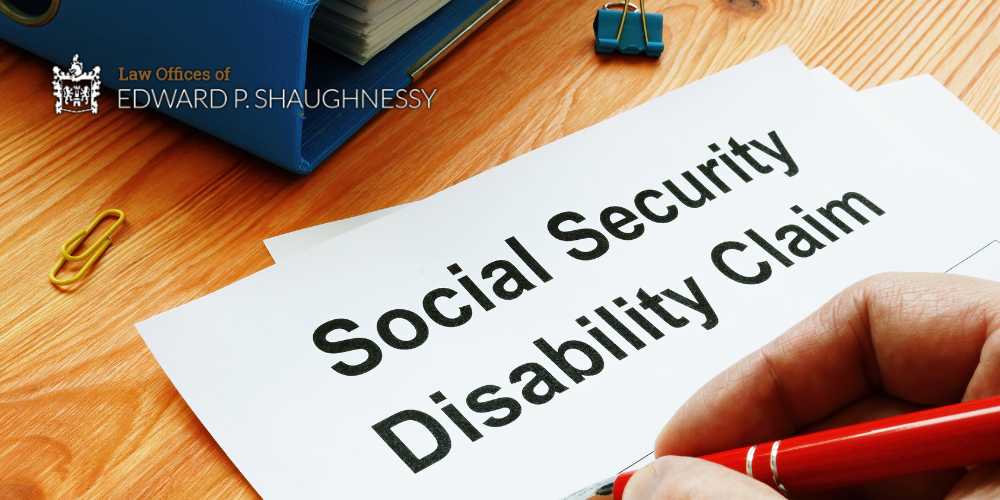Social Security Disability Lawyer Easton, PA
Home » Practice Areas » Civil Litigation Attorney Easton PA » Social Security Disability Lawyer Easton, PA
Practice Areas
The Easton Social Security disability lawyer team at the law offices of Edward P. Shaughnessy specializes in representing clients who, due to serious injuries or a medical condition, are unable to maintain gainful employment. Our Easton Social Security disability lawyers understand the complexities involved in navigating Social Security disability claims. Many applicants, especially disabled workers with significant work history, find their initial application claims initially denied. Our role as your Social Security disability advocate is to assist you throughout this frustrating process, from compiling the necessary paperwork and refining your disability application to appealing a disability claim denied by the Social Security Administration. Our experienced disability attorneys strive to secure the social security benefits those who are considered disabled need to support themselves when they have little or no income and ensure clients’ rights are protected when pursuing long-term disability assistance.
Contact our law office at 610-258-9955 to schedule a free case evaluation and no-obligation consultation with an Easton SSD attorney regarding social security disability claims.

What is Social Security Disability Insurance?
Social Security Disability Insurance (SSDI) is a federal program designed to provide financial assistance to disabled individuals who are unable to remain gainfully employed due to a qualifying disability or mental health illness. Social Security disability benefits provide disabled citizens with monthly payments until their disability stops, until they are gainfully employed, or until they begin receiving retirement benefits.
Eligibility for SSD benefits is based on an individual’s work history and whether or not they are considered “disabled” by the Social Security Administration’s standards. Normally, this includes any physical or mental impairment that prevents them from substantial work and is expected to last for at least a year or result in death
Pennsylvania Social Security Disability Benefits
Below are the different types of social security benefits people can seek through the Social Security system.
Social Security Disability Insurance Benefits (SSD or SSDI)
Disability benefits, often referred to as Social Security Disability (SSD) or Social Security Disability Insurance (SSDI), are federal programs aimed at providing financial assistance to individuals who are unable to maintain gainful employment due to a disability determination expected to last at least one year or result in death.
SSD benefits are different from supplemental security income (SSI) benefits, which provide income benefits to those with limited income or no income. Eligibility requirements include that the person filing the disability claim has no income and they are either over the age of 65, disabled, or blind.
Disabled Adult Child Benefits (DAC)
Disabled Adult Child Benefits (DAC) are available to individuals who became disabled before reaching the age of 22 and are the child of a parent who is either deceased, retired, or disabled and entitled to Social Security benefits.
These benefits for disabled adults living with parents provide financial assistance to disabled adult children who are unable to work due to their disability, offering a monthly income to help cover living expenses.
Disabled Widow or Widower (DWB)
Disabled Widow or Widower Benefits (DWB) are a type of benefit available to widows or widowers who are disabled and meet certain eligibility criteria. DWB benefits provide financial support to disabled people who have lost their spouse, helping them cover living expenses.
To qualify for DWB benefits, the individual must be the surviving spouse of a deceased worker who was insured under Social Security. Additionally, the widow or widower must have become disabled within a certain time frame after the spouse’s death or before a specific age and meet the definition of disability.
Benefits for Disabled Children
There are also Social Security Disability benefits available for disabled children. These benefits aim to support families caring for children who have significant disabilities that interfere with their daily functioning. Eligibility for these Social Security Disability benefits is based on the child’s medical condition and the family’s financial situation.

What Medical Conditions Qualify for Social Security Disability?
Social Security benefits are available to individuals who have contributed to the Social Security system through payroll taxes during their working years. Similarly, Social Security Disability benefits are available to individuals who have a qualifying disability and have contributed to the Social Security system during their working years.
If you have a disability that prevents you from working for a year or more, you may be eligible for SSD benefits. However, you must have worked long enough and recently enough to meet the requirements. The full list of qualifying criteria can be found on the SSA’s website.
Some qualifying disabilities for Social Security Disability include:
- Musculoskeletal disorders (e.g., back injuries, arthritis)
- Cardiovascular conditions (e.g., heart failure, coronary artery disease)
- Respiratory disorders (e.g., chronic obstructive pulmonary disease, asthma)
- Mental disorders (e.g., depression, bipolar disorder, anxiety, schizophrenia)
- Neurological disorders (e.g., epilepsy, multiple sclerosis, Parkinson’s disease)
- Immune system disorders (e.g., lupus, HIV/AIDS)
- Digestive system disorders (e.g., Crohn’s disease, liver disease)
- Cancer and malignant neoplastic diseases
- Endocrine disorders (e.g., diabetes, thyroid disorders)
- Renal (kidney) disorders
- Blindness
In addition to the type of condition a person has, the severity of their condition and its impact on their ability to work can affect a person’s eligibility for benefits. Some conditions, like lung cancer or blindness, can automatically qualify you for benefits without proof of how it affects your ability to work.
Qualifying Questions That the Social Security Administration Asks
In order to determine whether or not someone qualifies for Social Security Disability benefits, the Social Security Administration will ask a few key questions. The main qualifying questions they ask are:
- Are you working?
- Is your condition considered “severe”?
- Is your condition a qualifying illness listed by the SSA?
- Can you continue to work the same as before developing your condition?
- Can you do any other type of work?
They will also require basic information from you, such as your:
- Personal information
- Work history
- Medical history
- Functional limitations
These questions help the SSA assess the severity of the disability and its impact on the individual’s ability to work.
What are the Rules for Working While on SSDI?
To qualify for SSDI benefits, an individual must have a qualifying disability AND must have worked and earned enough work credits through employment covered by Social Security. Work credits are based on total annual wages or self-employment income, and the number of credits needed depends on the individual’s age at the time they become disabled.
What is the Income Limit for SSDI?
As of 2024, a person will earn 1 credit for every $1,730 they earn in wages or self-employment income, with a maximum of 4 credits per year. The number of credits needed to qualify is based on the person’s age at the time of application. These requirements are:
- Before age 24 – 6 credits in the 3-year period since disability began
- Age 24 to 31 – credit for working half of the time between age 21 and when the disability began
- Age 31 and older – 20 credits in the 10-year period since disability began
It’s important to note that individuals who don’t meet these work credit eligibility requirements may still be eligible for Supplemental Security Income benefits based on financial need and disability.

How To Apply for Social Security Disability Benefits in Easton, PA
To apply for Social Security Disability Insurance (SSDI) benefits, individuals can either visit their local Social Security office, call the Social Security Administration’s toll-free number, or apply online through the SSA’s website. They can also contact a Social Security Disability attorney or Social Security Disability advocate who can help them through the disability application process and ensure things are done right.
Before the initial application, gather necessary documentation such as medical records, work history, and other relevant information. Complete the initial application accurately and provide detailed information about the medical condition and its impact on substantial work ability. After submitting the application and necessary paperwork, the SSA will review the information provided and may request additional documentation or schedule a medical evaluation.
Why Was My SSDI Claim Denied?
There are a number of different reasons why your SSDI claim was denied. Below are some of the most common reasons why SSDI claims are denied. If the SSA denies your SSDI claim, you can make a request to Disability Determination Services for an appeal. A Social Security Disability attorney can help you through the appeals process and ensure you have the best chance at receiving benefits.
You’re Capable of Making Too Much Money
The SSA assesses your ability to work based on both your medical condition and your past work history. If the SSA determines that you can perform substantial gainful activity (SGA), meaning you can earn more than a certain amount each month, you may be ineligible for disability payments.
You Disobeyed the Doctor’s Orders
If you fail to follow orders from your medical providers, the SSA may deny your claim. The SSA expects claimants to actively participate in treatment that could improve their condition and ability to work.
You Didn’t Have Enough Medical Records
Insufficient medical documentation is a common reason for SSDI claim denials. The SSA relies heavily on medical records and other evidence to evaluate disability claims and determine the severity of a person’s impairments. If your claim lacks comprehensive treatment records, diagnostic test results, and physician notes detailing the nature and extent of your condition, the SSA may deny your disability claim due to a lack of evidence.
You Didn't Cooperate During the Disability Application Process
Another reason your SSDI disability claim may be denied is if you refuse to cooperate with the Social Security Administration during the application process. Failure to submit necessary documentation, attend medical evaluations, or cooperate with SSA inquiries can result in a denial of benefits.
For the appeals process after refusing to cooperate with the SSA, you’ll need to provide a valid explanation for any missed appointments or unsubmitted documents. You’ll also need to comply with any outstanding requests from the SSA in a timely manner.
Your Disability Is Connected to a Criminal Conviction
If you have a qualifying disability, but it is connected to a criminal conviction (like an injury sustained during the commission of a crime), your SSDI claim may be denied. The SSA has specific rules regarding disability benefits for those whose impairments are related to criminal activity. If your disability claim is denied due to a criminal conviction, consider seeking legal advice to explore your options for appeal.
The Disability Is Based on Alcohol or Drug Addiction
Similarly, if your condition is related to a drug or alcohol addiction, your disability claim may be denied. The Social Security Administration (SSA) has specific rules regarding disability benefits for individuals with substance abuse-related impairments. Generally, the SSA will not award benefits solely on the basis of alcoholism or drug addiction.
However, if you have a co-occurring medical condition that independently qualifies you for SSDI benefits, such as liver disease or mental illness, you may still be eligible for benefits. It’s crucial to provide thorough documentation of your medical condition and its impact on your ability to work when appealing a denial based on substance abuse-related disability.
You Don't Have a Long-Term Disability
If the SSA determines that your condition is not expected to last long enough, they may deny your application for benefits. To qualify for SSDI benefits, your long-term disability must be expected to last at least a year or result in death.
If the SSA believes your condition will improve within a year or that it’s not severe enough to meet the long-term disability requirement, your claim may be denied. However, if you can provide medical evidence demonstrating the chronic or long-term nature of your disability, you may have grounds for an appeal.

Can You Collect Social Security Disability and Workers’ Comp at the Same Time?
Yes, it’s possible for disabled workers to receive both Workers’ Compensation (WC) benefits and Social Security Disability Insurance (SSDI) benefits at the same time, but the total amount you receive from both programs may be subject to certain limitations.
Does a Workers’ Compensation Settlement Affect Social Security Disability?
Generally, the combined benefits from workers’ comp and SSDI cannot exceed 80% of your average current earnings before becoming disabled. Coordination between the two programs is essential, as workers’ compensation benefits may affect your SSDI eligibility or vice versa.
If you are looking to receive both SSDI benefits and workers’ comp benefits, Easton workers’ compensation attorney Ed Shaughnessy can help. With his experience in both fields, his Lehigh Valley law firm can help ensure you are able to receive the financial assistance you need.
What is the Maximum Attorney Fee for Social Security Disability?
Your Social Security Disability lawyer will typically work on a contingency fee basis, meaning Social Security disability lawyers will only get paid if they win your case. The fee is usually capped at 25% of your past-due benefits, up to a maximum amount set by the Social Security Administration, which is currently $7,200. If your social security disability lawyer doesn’t win your case, you generally won’t owe them any fees.
Why You Need an Easton Social Security Disability Lawyer
Navigating the complexities of the Social Security Disability Insurance (SSDI) process can be daunting, especially when facing the challenges of a medical condition. A Social Security Disability attorney can help evaluate your eligibility and determine what documentation you’ll need to file a disability claim in a timely manner. Social Security Disability lawyers can also help you through the initial application process, ensuring that you have the best chance of receiving benefits.
Additionally, experienced disability attorneys will understand the appeals process and can help their clients with the appeals process. If needed, your Social Security Disability attorney can even take the appeal to federal district court. Having a Social Security Disability lawyer by your side throughout the process can help ensure you have the legal guidance and personal support you need to seek the disability benefits you deserve.
Easton civil litigation attorney Edward P. Shaughnessy understands the intricacies of disability law and can guide you through every step of your disability claim. From gathering essential medical records to representing your interests in appeals, our Easton Social Security Disability attorneys are dedicated to helping you secure the disability benefits you deserve.

Easton Social Security Disability Attorney
Applying for Social Security Disability can be daunting, especially while suffering from a medical condition. If you’re in Easton, PA, and struggling to navigate the intricacies of filing for SSDI benefits, the experienced attorneys at the Law Offices of Edward P. Shaughnessy are here to help.
Attorney Ed Shaughnessy is committed to providing compassionate and knowledgeable representation to individuals facing disabilities. With years of experience in handling SSDI claims, he understands the challenges you may be facing and is dedicated to helping you secure the benefits you deserve.
Take your first step towards financial relief–contact our law firm at 610-258-9955 or fill out our online form to schedule a free consultation with an experienced Easton Social Security disability lawyer.
Contact Us Today For a Free Consultation!





